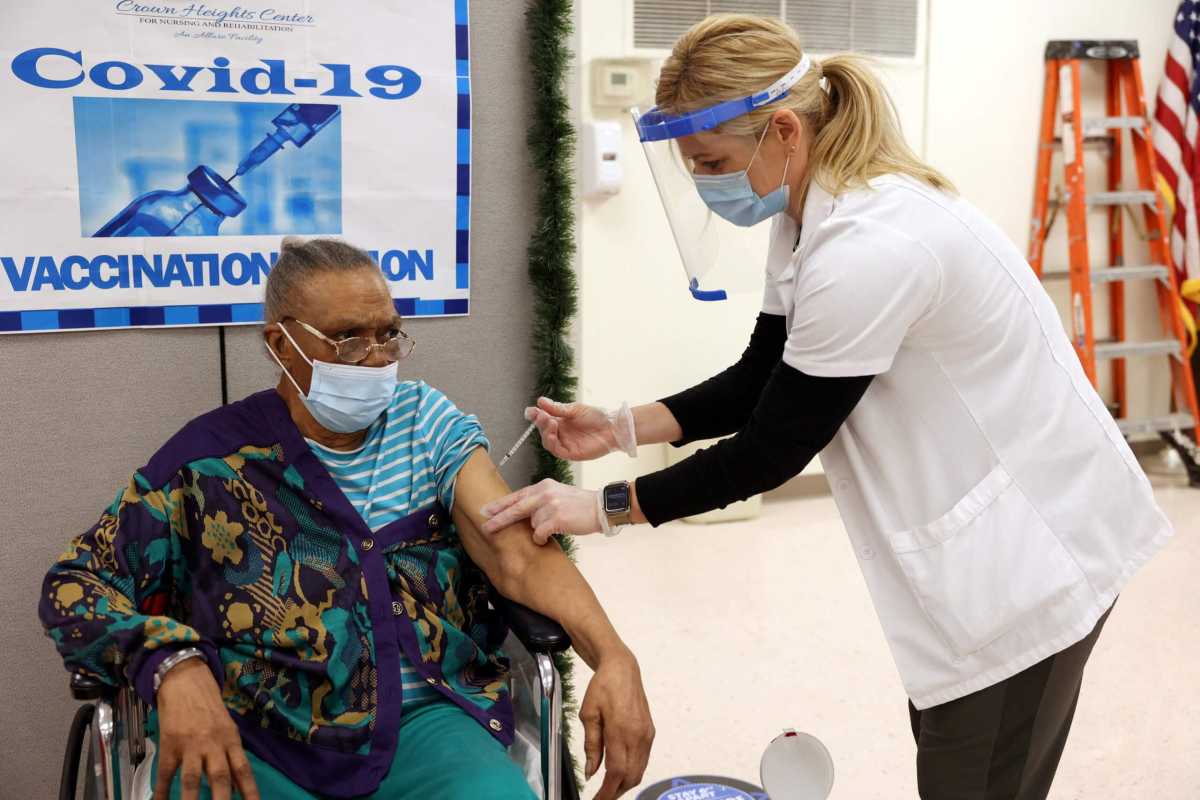A new COVID-19 variant is starting to spread in the United States and has been found in NYC — possibly becoming the virus’ dominant strain as the country enters into cold and flu season, doctors are reporting.
XEC is the new variant. It is a subvariant of the infamous Omicron strain, which, according to a Yale Medicine article, gave rise to “multiple descendants” since it hit the United States in 2021.
XEC first appeared in Germany in June 2024 before it spread throughout Europe. By the end of September, XEC had been detected in at least 25 U.S. states, according to Yale Medicine. It has also been detected in a hospital in NYC.
COVID-19 declining in NYC, at least for now
Despite the emergence of a new variant, there is good news: The U.S. Centers for Disease Control and Prevention (CDC) reports that current COVID-19 rates are declining across the country and in New York as of Oct. 1.
Isaac Dapkins, M.D., chief medical officer at the Family Health Centers at NYU Langone Health, said COVID-19 rates are down in the city, but that could easily change once the weather cools down.
“It really has to do a lot with the weather,” he said. “When it gets cold, people are more likely to be around each other, more inside, more runny noses arise. People are more likely to be cooped up. So we haven’t really had that seasonal change yet to really push everybody to be indoors. So the illness level hasn’t gone up yet.”
He added that becoming infected with COVID-19 has a lot to do with risk, as has historically been the case with the virus.
“You’re talking about risk. Your risk of getting infected, and then your risk of getting sick once you’re infected,” the doctor said. “Omicron was way more infectious, but didn’t necessarily make you more sick if you are healthy and well. But if you’re somebody who has immunodeficiency or who has a lot of other medical problems, then still getting COVID still has risks.”
At the height of the pandemic, people tested for COVID-19 at hospitals, medical offices and various pop-up sites. But now that at-home tests are more popular, COVID-19 data is primarily based on in-patient testing and hospitalizations, Dapkins explained.
COVID-19 hospitalizations still do occur, he said, but not often.
“Thankfully, that really has not been something we have seen a lot of in the past three months,” Dapkins said. “We have not had any significant number of severe COVID cases. Every once in a while we do have one person who ends up in the ICU, but it’s very, very rare.”
Manish Sharma, D.O., chief of emergency medicine at NewYork-Presbyterian Queens, added that COVID cases rose in July but have declined.
“COVID cases rose in July, reaching a peak in mid to late July 2024 and have been steadily declining over August and September,” Sharma said. “The same applies to hospitalizations related to COVID.”
The new variant of COVID-19: Are symptoms, illness and risk factors the same?
XEC is not expected to cause worse symptoms or more severe disease than other recent strains, according to Yale Medicine.
The risk factors are still the same, too.
“People who are at risk are the same people as before,” Dapkins said. “These are people with chronic lung disease, people who have had treatment for cancer. Obesity is still a risk factor.”


What about vaccines?
Doctors recommend vaccination for anyone who has a risk factor for COVID-19. Even with XEC circulating, updated vaccines can help prevent infection.
“Those folks really benefit from vaccination, including the new vaccines,” Dapkins said. “Although there is a new variant, it’s a combination of a Omicron-related variants. The new vaccine, like the flu vaccine, is put together based on what’s circulating at the time they make the vaccine. So, this new variant is very related to the old variant, and therefore, we expect it to have protection, although it is still up in the air.”
Doctors at NYC Health and Hospitals added that vaccination can reduce the risk of hospitalization and even death.
Machelle Allen, M.D., chief medical officer and senior vice president of NYC Health and Hospitals, added that updated COVID-19 vaccines offer “the best” protection against current and emerging variants.
“I cannot emphasize enough the importance of being vaccinated. The flu and COVID-19 vaccines are safe, effective, readily available, and can save your life,” Allen said. “The updated vaccines provide the best protection against current strains. I encourage all New Yorkers to do their part—get vaccinated to take care of yourself, your family, and your community.”
NYC Health and Hospitals said this year’s flu and COVID-19 vaccines are available for patients at its hospitals and Gotham Health sites.
There are some medications doctors use to treat COVID-19, and there are steps individuals can take to help prevent the spread of infection, including:
- Cover your coughs and sneezing. Coughing into your elbow instead of your hand is ideal.
- Wash your hands.
- Stay home if you’re sick.
More information about COVID-19, including when you should see a doctor, is available at cdc.gov.
Read more: Manhattan Stores Face Pressure Over OTC Card Acceptance




































